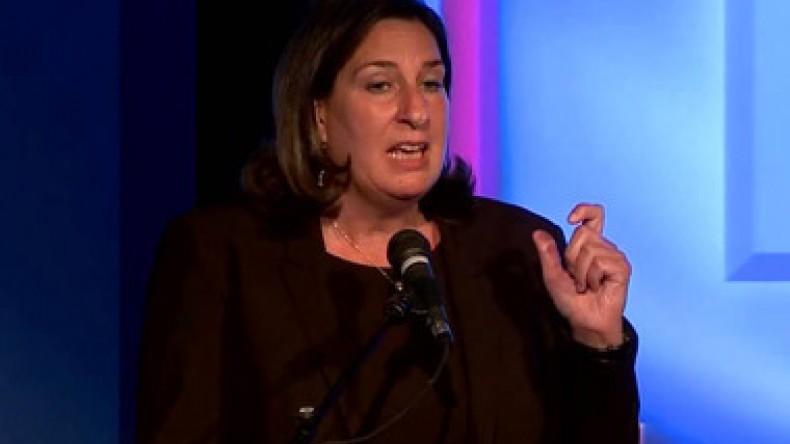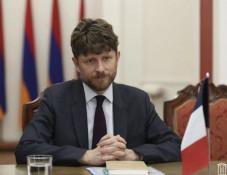
Newrepublic.com: Brenda Shaffer polishes image of Azerbaijan autocracy not disclosing her ties with government
“The woman across the table demanded to know my cholesterol count. This was in front of 30 others, during an on-the-record discussion at Columbia University, where the woman—an academic named Brenda Shaffer, a political science professor at the University of Haifa—replied to my question about her non-disclosures with questions of her own,” Casey Michel writes on the site Newrepublic.com.
As the author notes question on his cholesterol, his wife and tuition fees was not discussed in anywhere else, but at the presentation of Azerbaijan’s plans on redirection of Caspian gas through the Southern Gas Corridor to the European market. The panel featured Shaffer and Vitaliy Baylarbayov, the deputy vice president from SOCAR, Azerbaijan’s state-run hydrocarbon company. Halfway through the discussion, when the moderator, Jesse McCormick of the Center on Global Energy Policy, referred to Shaffer as a “panelist," she stopped him. “Moderator,” she corrected. The discussion continued, through some confused looks.
“Once the floor opened, I raised my hand, interested in the role Tony Blair was playing in lobbying for Azerbaijan's pipeline interests. I was also interested in Shaffer’s role that day—and why she decided not to disclose her relationship with the Azerbaijani government. A few weeks earlier, Shaffer penned an op-ed in The New York Times claiming that Azerbaijan was the West’s important security partner and that, bizarrely, Russia’s “next land grab” would take place in the South Caucasus—rather than, say, Moldova or northern Kazakhstan. While most analysts scratched their heads at Shaffer’s reasoning, others focused on why she wrote the article in the first place. As first reported by RFE/RL, her impetus may have come from her role as an adviser “for strategic affairs” for the president of SOCAR,” the author writes.
The author writes that when the relationship with the Azerbaijani authorities and Shaffer came to light, the Times was forced to issue an editor's note saying Shaffer had breached a contractual obligation to “disclose conflicts of interest, actual or potential.” Shortly thereafter, TheWashington Post followed suit, issuing a clarification on an op-ed in which Shaffer had stumped for Azerbaijan’s pipeline push. It's not clear whether members of Congress knew of Shaffer’s relationship when she testified at a commission hearing over the summer, a discussion in which, in her stated capacity as a scholar, she spoke glowingly of Baku’s role as an American partner.
“When I learned Shaffer would be speaking about Azerbaijan’s hydrocarbon potential—and when I saw that she would pose simply as an academic, rather than disclosing her position as an official adviser to the government-run energy behemoth—I saw an opportunity to ask why she was so loath to disclose that relationship,” Michel writes adding that the discussion was recorded and it was open.
Shaffer in response began to ask personal questions and interrupted the moderator, trying to call to order. She raised her tone and the moderator changed the subject. “The back-and-forth between me and Shaffer ended up as a story in its own right. But I never got my answers. Shaffer has since continued offering both broad analyses andarguments against Azerbaijan’s hydrocarbon competitors, always as an academic, never disclosing her role as adviser,” Michel writes.
Perhaps it’s not fair to single out Shaffer; she’s certainly not the only one who has failed to disclose relations with organizations propelling post-Soviet autocracies. Hilary Kramer in late 2012, as Azerbaijan’s civil rights backslide became a full-blown clampdown, Kramer also staked that “Azerbaijan has charted a path for itself that is not ideological, but open.” “Considering Azerbaijan currently boasts twice as many political prisoners as Russia and Belarus combined, the claim is, at the least, questionable. To Forbes’ credit, Kramer has not written for the publication since her relationship came to light. But Shaffer, for one, continues to make the rounds—with NPR, with the BBC—without pointing out that her position as an official adviser with Baku undermines any claims she has to objectivity. These people continue to peddle their work, failing to disclose but willing to buff the autocracies swamping the post-Soviet landscape. They're part of alarger nexus of public-relations swill aimed at drowning out human rights concerns in the region. Unlike the questions Shaffer lobbed at me, their conflicts aren't personal—they're business,” the author writes.
Newsfeed
Videos






























